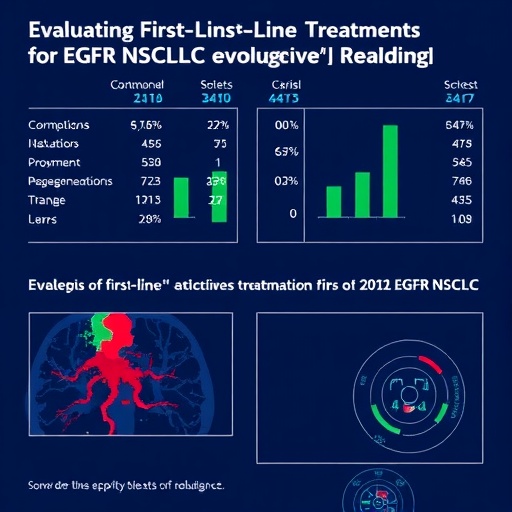In the rapidly evolving landscape of lung cancer treatment, a groundbreaking study has emerged, offering unprecedented insight into tailored first-line therapies for patients with advanced non-small cell lung cancer (NSCLC) harboring epidermal growth factor receptor (EGFR) mutations. Published ahead of print in BMC Cancer, this comprehensive network meta-analysis (NMA) synthesizes data from 37 randomized controlled trials (RCTs) involving 24 distinct treatment regimens, charting a path toward precision medicine that aligns therapeutic approaches with individual clinicopathological profiles.
EGFR mutations represent a critical molecular driver in a significant subset of NSCLC cases, making targeted therapy a cornerstone in clinical management. However, the heterogeneity of EGFR mutation subtypes, alongside patient-specific factors such as age, gender, and ethnicity, has complicated the selection of the most efficacious first-line treatments. Recognizing this complexity, the authors of the current study performed an extensive literature search across EMBASE, Cochrane Library, PubMed, and the Web of Science databases and integrated findings from conference abstracts, ensuring a robust dataset encompassing the latest clinical evidence up to December 2023.
A pivotal finding from this meta-analysis is the superior progression-free survival (PFS) associated with the combination of osimertinib and chemotherapy (CT) in the overall patient population. This regimen not only prolonged the period during which the cancer does not advance but also demonstrated consistent efficacy regardless of patient gender or specific EGFR mutation subtype. Osimertinib, a third-generation EGFR tyrosine kinase inhibitor (EGFR-TKI), when paired with traditional chemotherapy agents, appears to harness synergistic effects that may overcome resistance mechanisms commonly encountered in monotherapy.
Diving deeper into subgroup analyses, the study uncovered differential efficacy patterns tailored to distinct demographics. For Asian populations and elderly patients — groups often underrepresented in clinical trials but disproportionately affected by NSCLC — combinations diverging from the general cohort showed promise. Specifically, amivantamab paired with lazertinib emerged as the most effective in Asian cohorts, marking an innovative dual-targeting approach that inhibits both EGFR and MET pathways, integral in resistance and tumor proliferation. Meanwhile, icotinib plus chemotherapy provided the best PFS outcomes for elderly patients, underscoring the need for milder yet efficacious regimens in this vulnerable population.
Overall survival (OS), arguably the gold standard for assessing long-term treatment benefit, highlighted a different set of optimal strategies. Amivantamab combined with lazertinib excelled in extending survival, suggesting that dual inhibition may not only delay progression but also impact the underlying tumor biology to improve lifespan. Interestingly, bifurcating by mutation subtype revealed nuanced preferences: afatinib plus cetuximab delivered superior OS for patients with an exon 19 deletion (19del) mutation and male patients, whereas dacomitinib, another second-generation EGFR-TKI, showed enhanced OS benefits for female patients and those carrying the L858R mutation.
Additional targeted regimens also stood out within particular subgroups. Gefitinib combined with chemotherapy markedly improved OS in Asian patients, while erlotinib paired with bevacizumab, an anti-angiogenic agent, was more beneficial for elderly cases. These findings reinforce the importance of an individualized treatment matrix, optimizing the balance between efficacy and tolerability tailored to patient biology and genetic landscape.
The methodological rigor of this NMA lends credibility to its conclusions. By integrating direct and indirect comparisons across multiple RCTs and employing advanced statistical techniques, the study effectively navigates the challenge of heterogeneous trial designs and patient populations. Such an approach facilitates a comprehensive hierarchy of treatment options, guiding oncologists toward evidence-based decisions that incorporate both molecular diagnostics and clinical features.
Emerging therapies like amivantamab and lazertinib exemplify the next frontier in NSCLC treatment. Their dual-targeting mechanisms not only broaden the scope of actionable pathways but also open doors to combination regimens that may circumvent or delay resistance—a pervasive challenge in EGFR-mutated NSCLC management. The synergy observed with chemotherapy agents further amplifies this therapeutic potential, suggesting that integrated multimodal approaches could redefine the standard of care.
Moreover, the study highlights the critical need for continued research into demographic-specific responses. Asian and elderly patient subsets frequently exhibit distinct tumor biology and pharmacodynamics, which can significantly influence treatment efficacy and toxicity profiles. Tailoring regimens such as icotinib plus chemotherapy or erlotinib plus bevacizumab to these cohorts underscores a precision medicine paradigm that respects patient heterogeneity.
The findings hold significant implications for clinical guidelines and patient outcomes. The dual recognition of osimertinib plus chemotherapy and amivantamab plus lazertinib as leading first-line options delivers clarity amid a proliferation of available therapies. By identifying optimal regimens aligned with mutational status and demographic parameters, oncologists can better navigate therapeutic complexities and enhance both survival and quality of life for patients battling this aggressive cancer.
As the therapeutic landscape continues to evolve with novel agents and combinations, real-world validation of these findings will be essential. The integration of genomic testing, biomarker assessment, and longitudinal patient monitoring promises to refine personalized treatment further, ensuring that the right patients receive the right therapies at the right time.
In conclusion, this landmark network meta-analysis not only consolidates diverse clinical trial data into actionable knowledge but also advances the frontier of personalized oncology for advanced EGFR-mutated NSCLC. By elucidating nuanced efficacy profiles across subgroups and charting the superior first-line regimens, the study empowers clinicians to transcend one-size-fits-all approaches and embrace tailored combinations poised to transform patient care.
The ongoing quest to outsmart lung cancer’s adaptability now benefits from a roadmap informed by rigorous evidence, innovative therapeutics, and a deep understanding of patient diversity. With this foundation, the promise of markedly improved survival and durable responses for individuals grappling with advanced EGFR-mutated NSCLC becomes ever more attainable.
Subject of Research: First-line treatment efficacy for advanced EGFR-mutated non-small cell lung cancer across diverse clinicopathological subgroups.
Article Title: Assessing first-line treatment for advanced EGFR-mutated NSCLC in diverse clinicopathological subgroups: a systematic review and network meta-analysis
Article References:
Mei, T., Wang, T. & Zhou, Q. Assessing first-line treatment for advanced EGFR-mutated NSCLC in diverse clinicopathological subgroups: a systematic review and network meta-analysis.
BMC Cancer 25, 1767 (2025). https://doi.org/10.1186/s12885-025-15236-z
Image Credits: Scienmag.com
DOI: 14 November 2025




